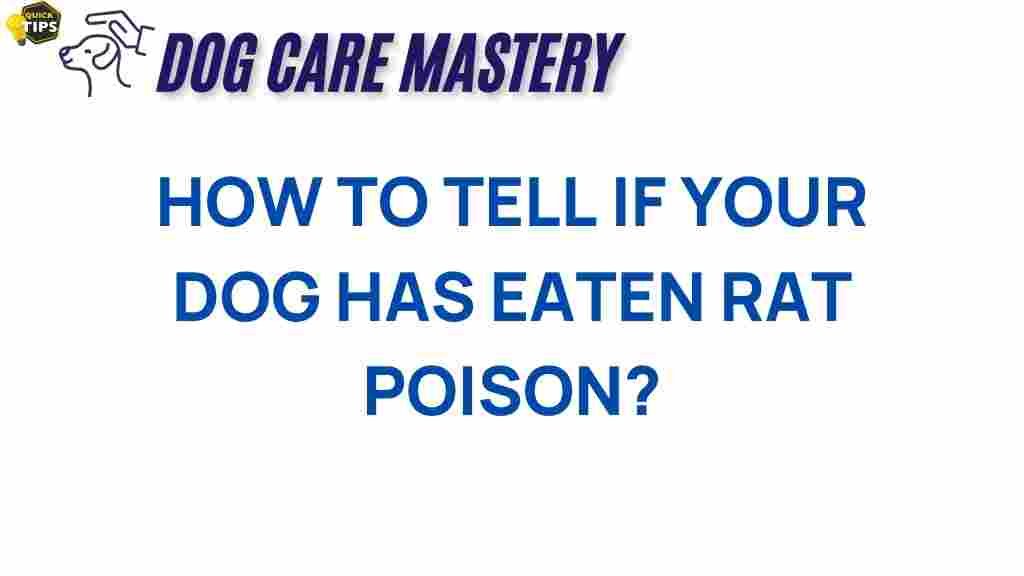Unveiling the Signs: Is Your Dog a Victim of Rat Poisoning?
As loving pet owners, we want to ensure the health and safety of our furry companions. Unfortunately, accidents can happen, and one of the most serious threats to dogs is rat poison. This toxic substance is designed to eliminate rodents but can have devastating effects on our pets if ingested. Understanding the signs of rat poisoning and knowing how to respond can save your dog’s life.
Understanding Rat Poison
Rat poison, commonly known as rodenticides, comes in various formulations, each designed to kill rats and mice effectively. However, these substances can be equally dangerous to pets, particularly dogs. There are several types of rat poisons, including:
- Anticoagulants: These prevent blood from clotting, leading to internal bleeding.
- Neurotoxins: These affect the nervous system and can cause seizures or paralysis.
- Metabolic poisons: These disrupt cellular processes and can lead to organ failure.
Being aware of the type of rat poison used in your area and its potential effects can help you recognize the signs of poisoning sooner.
Recognizing the Symptoms of Rat Poisoning
When a dog ingests rat poison, symptoms may not appear immediately. Depending on the type of poison, signs can manifest within hours to days. Here are common symptoms you should look out for:
- Vomiting: One of the first signs of poisoning may be vomiting, which can contain blood.
- Diarrhea: Liquid stool, sometimes with blood, can also indicate ingestion.
- Lethargy: If your dog seems unusually tired or less active, it could be a sign of distress.
- Increased Thirst: Excessive drinking can be a reaction to internal bleeding.
- Difficulty Breathing: Respiratory distress may occur if the poison affects the lungs.
- Seizures or Tremors: Neurotoxic poisons can lead to seizures or muscle tremors.
- Uncontrolled Bleeding: Look for bleeding from the nose, mouth, or rectum.
If you notice any of these symptoms, it’s crucial to act quickly. Time is of the essence when dealing with rat poison ingestion.
Step-by-Step: What to Do If You Suspect Rat Poisoning
If you suspect that your dog has ingested rat poison, follow these steps immediately:
- Stay Calm: Your dog can sense your anxiety. Staying calm will help you think clearly.
- Assess the Situation: Try to determine if your dog has actually ingested rat poison. Look for signs like an empty rat poison container or vomit that resembles the poison.
- Contact Your Veterinarian: Call your veterinarian or the nearest emergency animal clinic right away. Provide them with details about the suspected poison, the amount ingested, and your dog’s weight.
- Do Not Induce Vomiting Without Guidance: While inducing vomiting can sometimes be helpful, it should only be done under professional guidance.
- Gather Information: If possible, bring the poison container with you to the vet. This information can be crucial for treatment.
- Monitor Symptoms: Keep an eye on your dog’s symptoms, and report any changes to the vet.
Quick action can be the difference between life and death in cases of rat poisoning.
Troubleshooting: Identifying Potential Risks
Preventing rat poison ingestion is just as important as knowing how to respond. Here are some troubleshooting tips to mitigate risks:
- Keep Rat Poison Out of Reach: Store all rodenticides in secure cabinets and out of reach of pets.
- Choose Pet-Safe Alternatives: If you have a rodent problem, consider using pet-safe traps or natural deterrents.
- Regularly Check Your Yard: Inspect your outdoor spaces for any signs of rodenticide use or leftover bait.
- Educate Your Family: Make sure everyone in the household understands the dangers of rat poison and knows how to handle it safely.
By taking these precautions, you can help protect your dog from accidental poisoning.
Conclusion
Understanding the risks associated with rat poison and recognizing the signs of poisoning in your dog is crucial for any pet owner. Always be proactive in preventing access to these dangerous substances and know the steps to take if an accident occurs. Remember, in cases of suspected poisoning, quick action can save your dog’s life. If you want to learn more about pet health and safety, check out this comprehensive guide on dog care.
Stay informed, stay vigilant, and keep your beloved pet safe from the dangers of rat poison.
This article is in the category Safety and created by dogcaremastery Team

1 thought on “Unveiling the Signs: Is Your Dog a Victim of Rat Poisoning?”